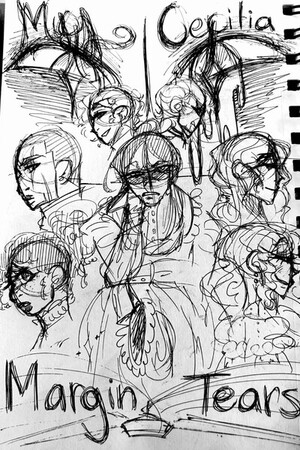Chapter 19:
A Pencil's Lead
Margin Tears: My Cecilia
Time seemed to stand still—Literally. Cecilia sat still for the entire morning, but the morning refused to end. The great grandfather clock only seemed to strike a new hour when she finally got to moving around the manor to perform her expected duties. Cecilia had not expected to return to this particular chamber again, yet fate—or perhaps the whims of the lord or Dmitri or the story or whatever—sent her down the east wing once more. The corridor seemed colder than before, and she felt a faint reluctance as she reached the familiar door.
When she entered, Atison was there still, though the change in him took her aback. His face, already pale and gaunt when she’d first met him, had thinned further, cheekbones sharp beneath skin that looked as fragile as parchment. The blanket wrapped around him seemed larger only because he had gotten smaller, engulfing him in a wrap of wool and cotton. Yet his eyes, those bright, bleary blues, still burned with intensity, and upon lifting his head to face her, he smiled warmly.
“You came back,” he said, voice weak but triumphant, as if he had won a bet upon her arrival. “I was beginning to think you were a dream.”
“I was told this room needed tending again,” she said briskly, setting her linen basket down before she paced over to his armchair. A severe unease settling in her stomach as she looked over his blanket, taking quick and often glances at his sweat-beaded face. “How are you feeling, Atison?”
“Of course the room needs tending,” Atison said, a cough of a laugh passing his lips. “Dust conspired on the shelves in your absence. I told it you would defeat it, but it laughed at me.”
She shook her head, trying to remain focused, not pressing for an answer to her question. He seemed to grow fainter even as his spirit burned brighter; it reminded her of the epic phoenix, but she was not so confident of his rebirth. Once she righted the blanket around his shoulders, Cecilia turned to busy herself with the curtains, tugging them open to let light spill in, hoping some sunlight—even the limited amount this house received—would do them all some good.
The sunlight caught on his sketchbook, lying open across his lap. A rough drawing sprawled across the page: a bird in mid-flight, wings stretched as it carried a long ribbon from its beak, the lines trembling but somehow alive.
“You’re still drawing,” she said before she could stop herself. Quickly, she added, “That’s good, very good.”
“As long as I can lift the pencil,” he answered. “Each line is a declaration. My body fails, but here—” He tapped the page with his thin finger. “—Here I still move, still fly.”
Cecilia frowned, face scrunching as her fists bunched the curtains in sweat-stained hands. “You speak as though that makes it better,” she muttered. “But you’re…” She trailed off, swallowing the lump in her throat before spitting, “You’re fading, Atison. Doesn’t it frighten you?”
His cough answered first, a violent fit that bent him forward. She hurried to steady him, but he waved her off, eyes still shining even as his breath rattled his ribs.
Once he’d caught his breath, he breathed, “Of course it frightens me.” He raised a finger, beckoning her to listen. “But fear is not the whole of me. I love the warmth of the sun on the glass. I love the sound of footsteps—yours—in this room. I love the scratch of ink across paper. These things will vanish, but right now, they are mine. They make me happy, and that’s enough.”
She looked at him, tense with something between frustration and concern. “What about when they’re gone?” she snapped, throwing her hands up in grievance. “What then?”
“Then nothing,” Atison said simply, giving a small shrug of his bony shoulders. “And because of that, we treasure them all the more while they’re here. While we’re here. That is the only rebellion worth making against the void.”
His words hit her like cold water. She wanted to argue, to beg him to do anything to help himself. Another part of her, though, the tired part that remembered the weight of every day in this manor, knew that his words held truth. In a world like this—hell, even in one like hers—every day brought new hardships and suffering. Perhaps fighting against such difficulty could take form in more than fighting at its most combative.
As she finished her work and prepared to leave, he called softly after her:
“Promise me you will not spend your life only fleeing shadows. There is beauty in so many things—Art, nature, people, books…” He paused, letting the words resonate, the last two seeming to sink heaviest, especially from the unusual spark in his eye. “Stop, sometimes, to touch the light.”
She did not answer, offering her usual polite bow and words of parting, but his message followed her into the corridor, echoing louder than his cough.




Please sign in to leave a comment.